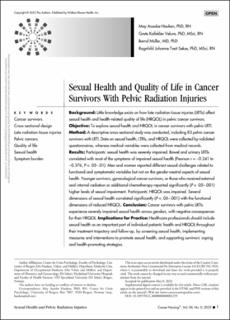| dc.contributor.author | Hauken, May Aasebø | |
| dc.contributor.author | Velure, Grete Kalleklev | |
| dc.contributor.author | Müller, Bernd Eckart Dirk | |
| dc.contributor.author | Sekse, Ragnhild Johanne Tveit | |
| dc.date.accessioned | 2024-03-15T09:41:27Z | |
| dc.date.available | 2024-03-15T09:41:27Z | |
| dc.date.created | 2024-01-15T21:00:41Z | |
| dc.date.issued | 2023 | |
| dc.identifier.citation | Hauken, May Aasebø PhD, RN; Velure, Grete Kalleklev PhD, MSci, RN; Müller, Bernd MD, PhD; Sekse, Ragnhild Johanne Tveit PhD, MSci, RN. Sexual Health and Quality of Life in Cancer Survivors With Pelvic Radiation Injuries. Cancer Nursing, July 14, 2023. | en_US |
| dc.identifier.issn | 0162-220X | |
| dc.identifier.uri | https://hdl.handle.net/11250/3122581 | |
| dc.description.abstract | Background: Little knowledge exists on how late radiation tissue injuries (LRTIs) affect sexual health and health-related quality of life (HRQOL) in pelvic cancer survivors. Objective: To explore sexual health and HRQOL in cancer survivors with pelvic LRTI.
Method: A descriptive cross-sectional study was conducted, including 83 pelvic cancer survivors with LRTI. Data on sexual health, LTRIs, and HRQOL were collected by validated questionnaires, whereas medical variables were collected from medical records.
Results: Participants’ sexual health was severely impaired. Bowel and urinary LRTIs correlated with most of the symptoms of impaired sexual health (Pearson r = −0.241 to −0.376, P < .05–.01). Men and women reported different sexual challenges related to functional and symptomatic variables but not on the gender-neutral aspects of sexual health. Younger survivors, gynecological cancer survivors, or those who received external and internal radiation or additional chemotherapy reported significantly (P < .05–.001) higher levels of sexual impairment. Participants’ HRQOL was impaired. Several dimensions of sexual health correlated significantly (P < .05–.001) with the functional dimensions of reduced HRQOL.
Conclusion: Cancer survivors with pelvic LRTIs experience severely impaired sexual health across genders, with negative consequences for their HRQOL.
Implications for Practice: Healthcare professionals should include sexual health as an important part of individual patients’ health and HRQOL throughout their treatment trajectory and follow-up, by screening sexual health, implementing measures and interventions to promote sexual health, and supporting survivors’ coping and health-promoting strategies. | en_US |
| dc.language.iso | eng | en_US |
| dc.publisher | Lippincott Williams & Wilkins | en_US |
| dc.rights | Attribution-NonCommercial-NoDerivatives 4.0 Internasjonal | * |
| dc.rights.uri | http://creativecommons.org/licenses/by-nc-nd/4.0/deed.no | * |
| dc.subject | symptom burden | en_US |
| dc.subject | sexual health | en_US |
| dc.subject | quality of life | en_US |
| dc.subject | pelvic cancers | en_US |
| dc.subject | late radiation tissue injuries | en_US |
| dc.subject | cross-sectional design | en_US |
| dc.subject | cancer survivors | en_US |
| dc.title | Sexual health and quality of life in cancer survivors with pelvic radiation injuries | en_US |
| dc.type | Peer reviewed | en_US |
| dc.type | Journal article | en_US |
| dc.description.version | publishedVersion | en_US |
| dc.source.pagenumber | 1-10 | en_US |
| dc.source.journal | Cancer Nursing | en_US |
| dc.identifier.doi | 10.1097/NCC.0000000000001259 | |
| dc.identifier.cristin | 2227234 | |
| cristin.ispublished | true | |
| cristin.fulltext | original | |
| cristin.qualitycode | 2 | |

